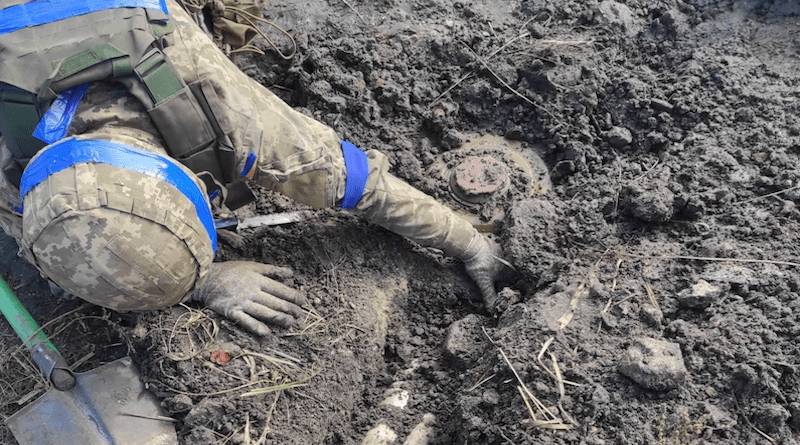US, Russian Defense Chiefs Talk As Fighting Rages In Ukraine
By VOA
By Jeff Seldin
The top U.S. and Russian defense officials spoke by phone for the first time in months Friday, as Russian officials indicated a new openness to possible negotiations and as Ukrainian forces edged closer to the Russian-occupied southern port city of Kherson.
The United States and Russia both issued readouts of the call between U.S. Defense Secretary Lloyd Austin and Russian Defense Minister Sergey Shoygu, agreeing the focus of the conversation was the war in Ukraine.
According to the Pentagon readout, Austin “emphasized the importance of maintaining lines of communication amid the ongoing war against Ukraine.”
A Kremlin readout noted the two officials “discussed international security problems, notably the situation in Ukraine.”
Prior to Friday’s call, the last time Austin and Shoygu spoke was May 13, when the U.S. defense secretary called for an immediate cease-fire in Ukraine.
The latest conversation, though, comes as the Kremlin appears eager to signal it is open to talks.
Spokesman Dmitry Peskov told reporters Friday that Russian President Vladimir Putin has been open to negotiations from “the very beginning.”
Putin “tried to initiate talks with both NATO and the United States even before the special military operation,” Peskov added, using the Russian term for its war in Ukraine.
Earlier Friday, Turkish President Recep Tayyip Erdogan also appeared to raise hopes for talks, saying Putin now appears to be “much softer and more open to negotiations.”
U.S. and NATO officials have said repeatedly that the quickest way for Putin to end the fighting would be for him to pull Russian forces from Ukraine, something the Russian leader has refused to do.
Western officials have likewise said the terms for any settlement would have to be agreed upon by Ukraine, which has vowed to retake all territories currently occupied by Russia, including Crimea, which was seized by Russia in 2014.
Despite the apparent Russian overtures, Moscow has consistently refused to negotiate the return of four Ukrainian regions that it annexed last month.
Ukrainian President Volodymyr Zelenskyy has also ruled out any talks with Moscow as long as Putin remains in power.
In the meantime, Ukrainian forces Friday continued to press their advantage against Russian forces in the Kherson region, targeting Russian resupply routes across the Dnieper River.
A spokesperson for Ukraine southern operational command said its forces struck a key bridge late Thursday, as well as a number of ferry crossings and pontoon bridges being used by Russia to supply its forces in Kherson.
Ukrainian President Volodymyr Zelenskyy on Thursday night accused Russia of preparing to blow up a key dam in the Kherson region.
In a televised address, Zelenskyy accused Russia of mining the Nova Kakhovka dam. Destroying the dam would flood the Dnieper River and halt the advance of Ukrainian troops.
“Now everyone in the world must act powerfully and quickly to prevent a new Russian terrorist attack. Destroying the dam would mean a large-scale disaster,” he warned.
Fighting continued elsewhere in Ukraine Friday, with explosions also reported around the Ukrainian cities of Kharkiv and Zaporizhzhia. Zaporizhzhia is the home of Ukraine’s nuclear power plant, and the extent of the damage from the blast there was not immediately clear.
Also Friday, France, Germany and Britain called for the United Nations to investigate allegations that Russia is using Iranian drones for attacks in Ukraine.
A letter from the French, German and British mission to the U.N. cited “significant open-source evidence, including photographs and video, of Russia deploying Mohajer and Shahed series UAVs [unmanned aerial vehicles] in Ukraine.”
It says the transfer of such weapons violates U.N. Security Council resolutions.
The U.S. on Thursday alleged Iranian military personnel are “on the ground” in Ukraine, assisting the Russian military with drone operations that have been terrorizing the country and targeting power facilities.
“Our understanding is that they [Iranian forces] are on the ground in Crimea, assisting Russian military personnel as they conduct these drone operations in Ukraine,” Pentagon press secretary Brigadier General Pat Ryder told reporters.
When asked about Russia denying it uses Iran-made drones, Ryder responded, “It’s obvious that they’re lying” and charged Tehran with “exporting terror, not only in the Middle East region but now also to Ukraine.”
Also Thursday, White House National Security Council spokesperson John Kirby blamed Iranian-made drones launched from Crimea for recent attacks on the Ukrainian capital, Kyiv.
“Russia has received dozens of UAVs so far and will likely continue to receive additional shipments in the future,” Kirby said.
Iran’s U.N. ambassador told reporters his government categorically rejects the “unfounded and unsubstantiated claims,” which he said were part of a disinformation campaign against his government.
Russia’s deputy U.N. envoy told reporters the allegations are “baseless.” He said there have been no arms transfers in violation of the resolution, and no Iranian drones were supplied to Russia for use in Ukraine.
Separately Friday, U.S. Defense Secretary spoke by phone with Ukrainian Defense Minister Oleksii Reznikov.
During the call Austin reiterated “the unwavering U.S. commitment to supporting Ukraine’s ability to counter Russia’s aggression,” and he also “underscored the int’l community’s continued support in building Ukraine’s enduring strength,” according to a Pentagon readout.
VOA’s Margaret Besheer contributed to this story from the U.N. VOA’s Carla Babb contributed from the Pentagon.

